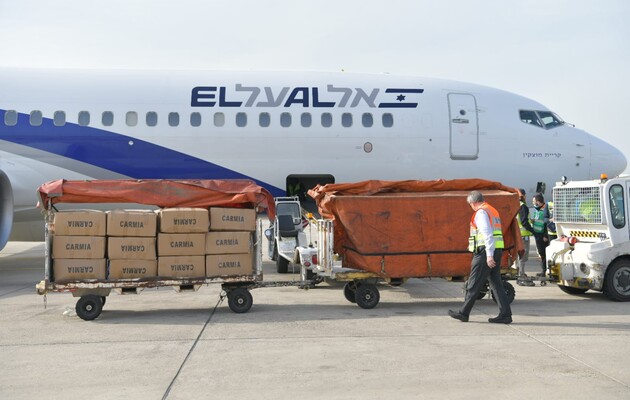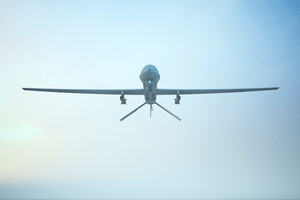Why Israel Does Not Give Air Defense Systems to Ukraine: Six Reasons

Today Benjamin Netanyahu’s newly formed cabinet will be sworn in.
Despite the fact that this is the most right-wing government in Israeli history (it includes representatives of ultra-nationalist and religious parties), Kyiv hopes for the shift in the “Ukrainian” policy of Tel Aviv and transition to a more active support for our country in repelling the Russian aggression. The activities of Iran and Russia in the Middle East give a chance for these hopes to be fulfilled.
For the last ten months, Bankova Street has experienced undisguised disappointment with the politics of the Israeli government: Volodymyr Zelenskyy expected better support from Tel Aviv to the government led by a Jew.
Of course, Tel Aviv condemned Russia’s aggression (by voting in favor of a respective UN General Assembly resolution) and supported the territorial integrity of Ukraine by not recognizing annexation of the occupied territories. Although since the beginning of the Russian full-scale invasion, Israel has undertaken not to become a “bypass road” for Russia’s circumvention of sanctions, Tel Aviv never imposed restrictive measures against the Russian Federation. On top of that, Israeli authorities have cynically treated Ukrainian refugees.
European countries have sheltered millions of Ukrainians, which Russian aggressors forced to flee their homes. But those compatriots who managed to find refuge in Israel came across discrimination. And so, in March, the Israeli government suspended the operation of the visa-free regime for our nationals and introduced compulsory registration. (Only in July, the Supreme Court reversed this decision.) The Israeli authorities also returned the practice of interviewing Ukrainians. Denials of entry into the country have become more frequent.
The greatest disappointment for Kyiv appears to be the limited cooperation of Israel and Ukraine in the defense sphere. For Bankova Street, Tel-Aviv’s refusal to provide us with an anti-ballistic missile defense system, the Iron Dome, became a major blow. (However, later, having gained a little insight into the specifics of this system, Kyiv calmed down a bit: the Iron Dome is effective against missiles made artisanally, but not “kinzhals” and “iskanders.”)
Kyiv is also frustrated by the fact that following February 24, the Israeli suspended all marketing licenses for military-type and dual-use goods. Israel has not provided any new marketing and export licenses after the full-scale invasion. In this situation, the good thing is that at least some contracts for export licenses obtained by Israeli procedures before February 24 had been completed.
Today, the Israeli state supplies us with helmets, body armor, medicines, generators, and rehabilitates our wounded soldiers. In one of the NATO states, Israel financed fuel delivery to Ukraine, ZN.UA reports. Apart from this, according to Israeli newspaper Haaretz, the Ministry of Defense of Israel allowed NATO allies to supply to Ukraine the arms, containing Israeli components such as electro-optical and fire control systems.
But Ukraine, where states and nations are fighting for existence, would like to receive more. In particular, air and missile defense, including early warning and anti-drone systems. But Israel does not intend to supply them. The Israeli side argues that “no government will take steps that will put security of Israel at risk,” “Russia is an incredibly powerful actor in the Middle East” and this is a key factor, especially as the Russian military is in Syria, where the Israelis are launching operations against the Iranians.
And another thing. Tel Aviv fears for the fate of the Jews in Russia. And do they not worry for the fate of Jews in Ukraine? After all, Ukrainian Jews, as millions of other nationals of our country, are daily under rocket and artillery attacks of Russians.
In conversation with ZN.UA, representatives of the Israeli side name other reasons.
First, air defense supplies from Israel are not fundamental: Ukraine had enough of western armaments. Second, in conditions of the aggravation of threats on the side of Iran and Hamas, Israel itself experiences a lack of air defense systems. Third, Ukraine is not ready to pay for weapons supply. Fourth, remembering former attempts to supply communications and drone systems to our country, the Israeli side speaks to the fact that business culture of Ukraine does not contribute to but hinders military-technical cooperation: “Ukrainians demand kickbacks. We do not work like this.”
Tel Aviv also fears that provision of Israeli arms to Ukraine will mean that Israel de facto will share technologies with Russia and Iran. This reason is one of the key factors why, as The National Interest reports, the Israelis do not transfer the Iron Dome to our country.
The fact that the Israeli delegation abstained in the voting of the UN General Assembly resolution providing for compensation to Ukraine for damage caused by the Russian invasion, added to the disappointment of Ukrainians. As one of the interlocutors of ZN.UA noted with sorrow, “the words ‘solidarity’ and ‘justice’ are not about the Israelis. They think of their own interests.” As a result, Bankova decided to abstract from their sentiments with regard to Israel and similarly follow the national interests: in our country, children are dying because of the Russian shellings, and air defense facilities are not enough.
The policy change was that Ukraine voted for the resolutions in the UN General Assembly, that Tel Aviv calls anti-Israel. Israeli diplomats were particularly outraged by Ukraine’s approval in the Fourth Committee of the UN General Assembly of the decision to send a request to the UN International Court of Justice on the legal consequences of “prolonged occupation, settlement and annexation of the Palestinian territory” since 1967.
Traditionally, Ukraine votes on the resolutions regarding Israel jointly and severally with the EU states. But a decision on the vote on the matter of the International Court of Justice, as ZN.UA reports, was made by the President of Ukraine himself.
“Kyiv harms itself. Any voting against Israel will negatively affect support of Ukraine,” our Israeli interlocutors warn. But Kyiv does not think so. On the contrary: the Ukrainian capital suggests that Ukraine’s voting in the Fourth Committee of the UN General Assembly not only drew the attention of Israel but will also have a positive effect in the cooperation in the realm of defense. In this case Kyiv will shortly change its position on this resolution in the voting in the session of the UN General Assembly.
New political realities in the Middle East, the formation of the new government in Israel and the strengthening of an informal union of Russia and Iran, serve as the basis for such optimistic assumptions. “We cannot rely on solidarity with Israel in the sphere of military-technical cooperation. But what concerns countering a common enemy, which is Iran, there’s hope that collaboration in the defense sphere will intensify,” spoke one of the high-profile Ukrainian interviewees in a conversation with ZN.UA on condition of anonymity.
In favor of this scenario says the fact that the union of Russia and Iran, bonded by shipments of Russians planes to the Islamic republic and Iranian drones to the Russian Federation, pushes Tehran to a more aggressive policy towards Saudi Arabia and Israel. Netanyahu’s right-wing cabinet will have to react to these threats and look for new allies. Apart from this, Russia is withdrawing its troops from Syria, thereby reducing its influence in the region. And this, in turn, unties the hands of Tel Aviv in the Syrian track.
How justified are Kyiv’s expectations? Benjamin Netanyahu made contradictory statements about the war in Ukraine during the electoral campaign. In one of the interviews he said that he would consider an opportunity to ship anti-aircraft batteries to Ukraine. However, in another interview, he praised the government of Yair Lapid for refraining from such shipments. Zelensky asserts: Netanyahu assured him that he would sort it out and consider how to help Ukraine receive the Israeli air defenses.
Senior Research Fellow at the Jerusalem Center for Public Affairs Yoni Ben-Menachem believes that Netanyahu will take a pro-Russian stance and try to restore Israel’s relations with Russia.
And statements about helping Ukraine made by Netanyahu during the election campaign do not mean that he will adhere to them, because Israel needs to maintain good relations with Russia, which has given the green light to bombing Iranian targets in Syria.
Ukrainian expert circles are also pessimistic. Director of the Center for Middle Eastern Studies Ihor Semyvolos noted in the commentary for ZN.UA that the ultra-right government of Netanyahu has obligations before the electorate, predominantly emotionally indifferent to Ukraine. “If they failed to do anything during the government of Lapid, which was more loyal with regard to Ukraine, now the chances are even less,” Semyvolos believes, paying attention to the fact that Russians have enough leverage to prevent the two countries from cooperating in the military-technical field.
Yet, official Kyiv hopes that under the influence of the Iranian factor, Netanyahu’s government will change Israel’s position on defense cooperation with Ukraine.
If in the upcoming telephone negotiations between Zelenskyy and Netanyahu, our country receives guarantees from Israel to shift the “red lines” and Tel Aviv reconsiders its position on military support to Ukraine, the Ukrainian delegation will change its stance in the voting at the UN General Assembly.
Kyiv constantly repeats that Ukraine does not want to aggravate relations with Israel: “The two countries have the time before this voting. And it should be used.” Moves should come not only from Kyiv, but also Tel Aviv. And now, the ball is in the Israeli half of the court.
Read this article in russian and Ukrainian.
Please select it with the mouse and press Ctrl+Enter or Submit a bug














 Login with Google
Login with Google